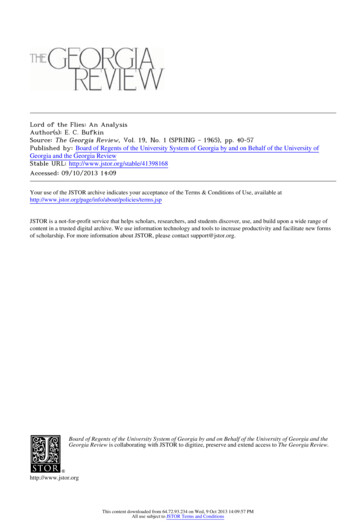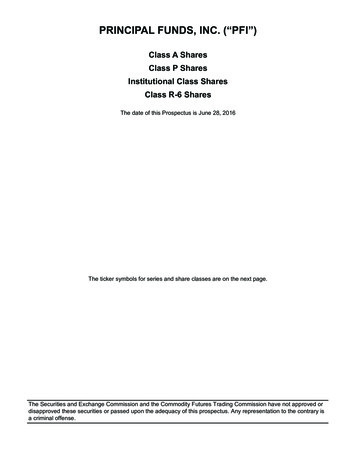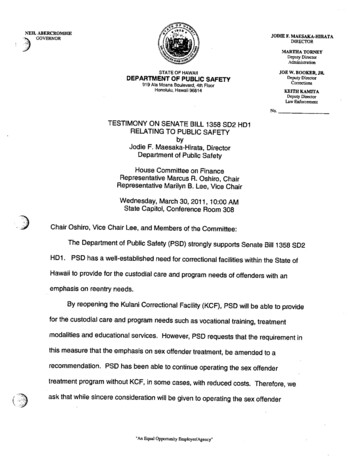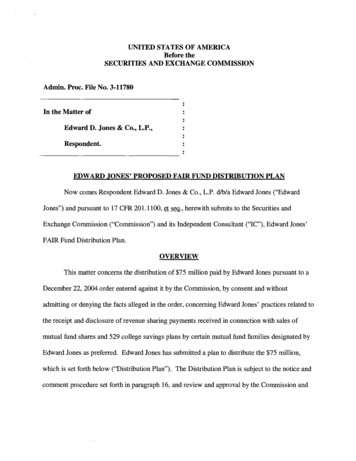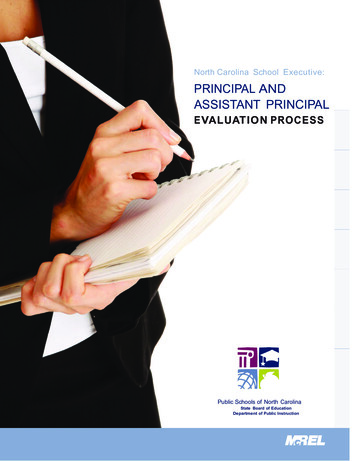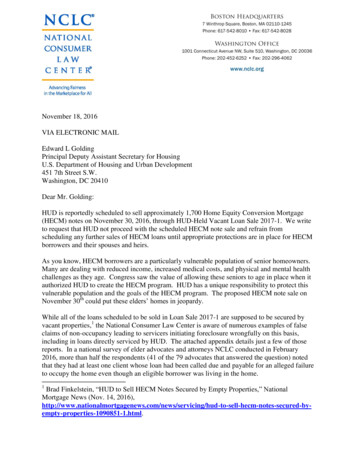
Transcription
November 18, 2016VIA ELECTRONIC MAILEdward L GoldingPrincipal Deputy Assistant Secretary for HousingU.S. Department of Housing and Urban Development451 7th Street S.W.Washington, DC 20410Dear Mr. Golding:HUD is reportedly scheduled to sell approximately 1,700 Home Equity Conversion Mortgage(HECM) notes on November 30, 2016, through HUD-Held Vacant Loan Sale 2017-1. We writeto request that HUD not proceed with the scheduled HECM note sale and refrain fromscheduling any further sales of HECM loans until appropriate protections are in place for HECMborrowers and their spouses and heirs.As you know, HECM borrowers are a particularly vulnerable population of senior homeowners.Many are dealing with reduced income, increased medical costs, and physical and mental healthchallenges as they age. Congress saw the value of allowing these seniors to age in place when itauthorized HUD to create the HECM program. HUD has a unique responsibility to protect thisvulnerable population and the goals of the HECM program. The proposed HECM note sale onNovember 30th could put these elders’ homes in jeopardy.While all of the loans scheduled to be sold in Loan Sale 2017-1 are supposed to be secured byvacant properties,1 the National Consumer Law Center is aware of numerous examples of falseclaims of non-occupancy leading to servicers initiating foreclosure wrongfully on this basis,including in loans directly serviced by HUD. The attached appendix details just a few of thosereports. In a national survey of elder advocates and attorneys NCLC conducted in February2016, more than half the respondents (41 of the 79 advocates that answered the question) notedthat they had at least one client whose loan had been called due and payable for an alleged failureto occupy the home even though an eligible borrower was living in the home.1Brad Finkelstein, “HUD to Sell HECM Notes Secured by Empty Properties,” NationalMortgage News (Nov. 14, erties-1090851-1.html.
For this reason, the scheduled sale raises serious concerns regarding whether the properties inquestion are in fact vacant and whether HUD can adequately protect the rights of HECMborrowers, their spouses, and their heirs prior to conducting such a sale. Mistakes about vacancyare especially likely for these elder homeowners because of their likelihood of temporaryhospitalization or nursing home care.To address this concern, we recommend that no sale proceed until HUD has protected thefollowing important rights of HECM borrowers and their spouses and heirs: The right to remain in the home until the borrower dies or permanently vacates the home.Unfortunately, all too often servicers falsely certify that a property is vacant and initiateforeclosure on the basis of non-occupancy when a borrower or spouse is still living in thehome. There is a serious concern that properties HUD believes to be vacant may notactually be vacant. A borrower might temporarily be in a hospital or nursing homefacility, and might not be able to respond to an occupancy certification, but might still beoccupying the home as his or her principal residence. The right of any non-borrowing spouse to live in the home until his or her death. HUDhas taken the position in the past that it has no way of tracking whether there is a nonborrowing spouse for any given HECM transaction (in loans originated prior to August2014). There is a serious concern that properties HUD believes to be vacant may beoccupied by a non-borrowing spouse who should be eligible to remain in the home underHUD’s MOE Assignment program, as provided in Mortgagee Letter 2015-15. The right to satisfy the HECM for the lesser of the loan balance or 95% of the currentfair market value of the house. Too often servicers fail to notify heirs of this option. Heirsmay wish to sell the house or pay off the HECM through a refinance, in order to continueliving in the family home, and must be given this opportunity prior to any note sale.To protect these rights of HECM borrowers, their spouses, and heirs, HUD should implement thefollowing protections before conducting any HECM note sale.Pre-AuctionBefore placing a loan into the pool, HUD should require its servicers to do the following:1. Send a notice to the property address and any other address contained in the servicing filenotifying the borrower and any occupant that HUD believes the property to be vacant andplans to sell the loan on the date of the anticipated note sale. Include in the notice arequest to contact the servicer within 30 days if someone is occupying the property. Suchnotice should be sent at least 60 days before any note sale. The notice should clearly statethat the note sale will terminate the loan’s association with the FHA program.2
2. Send a letter to the property address and attempt to contact any known heirs (or purportedheirs) regarding the opportunity to sell the house or otherwise satisfy the HECM loan forthe lesser of the current loan balance or 95% of the current fair market value. If an heirresponds by expressing interest in selling or satisfying the HECM loan, retain the HECMloan in order to allow the heir to do so within a reasonable time. Such letter should besent at least 60 days before any note sale.3. Send a representative in person to knock on the door to verify that the property is notoccupied. If no one answers the door, the representative should leave a dated cardrequesting a return call within one week and explaining that HUD believes the property isvacant and plans to take action on the date of the anticipated note sale. Such an in-personvisit should occur at least 30 days before any note sale.4. Do not sell HECM loans less than six months after the death of the last survivingborrower or, if an heir has made contact with the servicer within six months of the deathand is still marketing the property for sale, within a year after the death of the lastsurviving borrower.5. Require the servicer to have a copy of the death certificate of any person named on therecorded mortgage or deed and any non-borrowing spouse documented in the loan filebefore any note sale.Post-AuctionHUD should include the following requirements in the sale contract with note buyers:1. The note buyer should affirmatively reach out to the borrower and any occupant(s) of thehome through mail and in-person contact before initiating foreclosure to determinewhether the property may be occupied.2. If at any time after the sale it is determined that a borrower or spouse of a borrower isresiding in the home as their principal residence, the note buyer should sell the loan backto HUD and HUD will accept repurchase. HUD should identify a contact person atHUD who will have authority to respond to buy-back inquiries and requests.3. The note buyer should allow any heir or estate representative of a borrower to satisfy theHECM for the lesser of the current loan balance or 95% of the current fair market valueof the home.3
Senior homeowners who have paid for FHA insurance and entered into HECM transactions areentitled to rely on the protections that insurance provides for borrowers and their spouses andheirs. HUD should not engage in any note sale without adequately guaranteeing theseprotections. HECM borrowers and their spouses and heirs are a particularly vulnerablepopulation. A note sale on November 30th would be premature, because there is much more workto be done to ensure adequate protections are in place. Thank you for your attention to this letter,and we look forward to hearing back from you to address these concerns.Sincerely,Alys CohenStaff AttorneyNational Consumer Law CenterRichard DuboisExecutive DirectorNational Consumer Law Center4
Appendix A: Examples of HECM Borrowers Who have FacedForeclosure as a Result of False Claims of Non-OccupancyM. D., Philadelphia, PA, Age 82Catherine Martin, Community Legal ServicesM.D. was an 82 year old widow with health problems living in Philadelphia, PA. She had areverse mortgage with Wells Fargo, but failed to maintain the property taxes as her health failed.Wells Fargo paid the delinquent taxes, but foreclosed based on alleged non-occupancy. Ms. Dwas still living in the property as her primary residence, although she was intermittentlyhospitalized for a few weeks at a time. I visited her at her home, and she definitely resided in themortgaged property. Wells Fargo insisted that she sign a non-occupancy form, but the clientwould not sign because she lived in the property. We provided an affidavit to that effect in hopesthat Wells Fargo would discontinue the foreclosure action so she could enter into a repaymentplan. We couldn’t get anywhere with repayment of the delinquency, because Wells Fargocontinued to demand that she sign the non-occupancy form. There was a clear lack ofcommunication among Wells Fargo employees, because some representatives were convincedthe foreclosure was about delinquency, when clearly on its face it was erroneously about nonoccupancy. This issue was not resolved, but the homeowner passed away during the foreclosureaction. It was impossible for the client or me to make any headway in negotiating with WellsFargo.L.M., Marietta, GA, Age 71J. Rachel Scott, Atlanta Legal Aid SocietyL.M. has resided in her home continuously for the past 30 years, with no extended absences. Sheremembers returning her annual occupancy certifications each year when she receives them.Nonetheless, Celink called her loan due and payable for non-occupancy and conducted aforeclosure sale in December 2015. When the Atlanta Legal Aid Society requested rescission ofthe foreclosure, Celink was initially resistant and denied any wrongdoing. Accordingly, AtlantaLegal Aid Society contacted HUD on L.M.'s behalf. Upon reviewing the file, HUD stated thatthere was an appraisal conducted prior to the foreclosure sale which came back as "occupied." Infact, L.M. allowed the appraiser into her home to photograph the interior of the property. On thisbasis, Celink agreed to rescind the foreclosure sale so that L.M. can continue to reside in herhome. Many other homeowners who do not have the benefit of Atlanta Legal Aid or HUDinvestigating their cases may not be so fortunate.E. M., Jacksonville, FL, Age 76Lynn Drysdale, Jacksonville Area Legal AidClient has significant health problems. Nationstar refused to set up a post-judgment repaymentplan for a property charge default. Client was able to get Hardest Hit Funds/Elmore funds to pay5
the back taxes and insurance. Now Nationstar is refusing to dismiss the foreclosure because theyclaim the home is not occupied, and they will not accept my letter explaining that the client isliving in the home. This foreclosure cannot proceed under Florida law.O. L., Lakeland, FL, Age 92Lynn Drysdale, Jacksonville Area Legal AidClient is very feeble and has a very difficult time getting around. She also has poor eyesight.Her children are trying to help her as much as possible. Her servicer, Financial Freedom/CITBank, filed a foreclosure claiming alleged non-occupancy regarding her home of 40 years. Theyfigured out their mistake when we explained she was living in the home, and through ouradvocacy, we were able to get them to dismiss the foreclosure.Client 1, New Jersey, Age 82Renee Cadmus, Legal Services of New JerseyClient 1 is an 82 year old with a reverse mortgage with Reverse Mortgage Solutions, Inc.(“RMS”). He suffers from depression and failed to send in the certificate of occupancy toRMS. Although he was current on his taxes and insurance and lived in the property at all times,RMS filed a foreclosure action against him for failing to send in the certificate ofoccupancy. Client 1 immediately sent RMS and its attorneys proof that he was living in theproperty, including a utility bill, a property tax statement, a credit card bill, and a bankstatement. RMS and its attorneys refused to accept this proof and demanded Client 1 sign andreturn the certificate of occupancy. Client 1 sent the proof of occupancy to RMS. RMS continuedwith the foreclosure for months after receiving proof Client 1 was living in the property and formore than a month after receiving the certificate of occupancy. Only after intervention by LegalServices of New Jersey, did RMS dismiss the foreclosure.Client 2, New Jersey, Age 70Renee Cadmus, Legal Services of New JerseyReverse Mortgage Funding, LLC (“RMF”) filed a foreclosure on Client 2’s reverse mortgage foran alleged failure to occupy the property. Client 2 occupied the property at all times and evenspoke to a property inspection agent who was sent to client’s home to determine occupancy andtake pictures. Eventually, with the assistance of Legal Services of New Jersey, RMF dismissedthe foreclosure.6
HUD's MOE Assignment program, as provided in Mortgagee Letter 2015-15. The right to satisfy the HECM for the lesser of the loan balance or 95% of the current fair market value of the house. Too often servicers fail to notify heirs of this option. Heirs may wish to sell the house or pay off the HECM through a refinance, in order to continue



